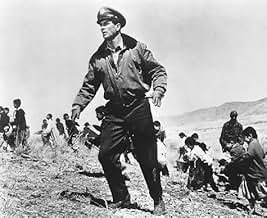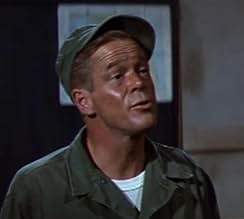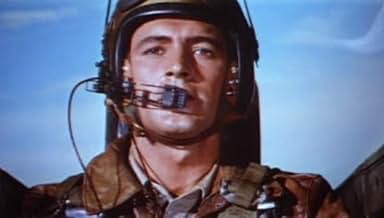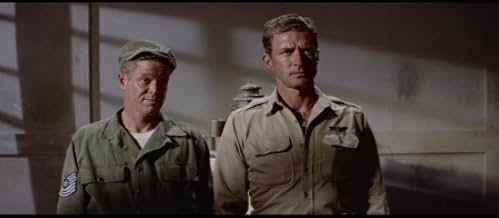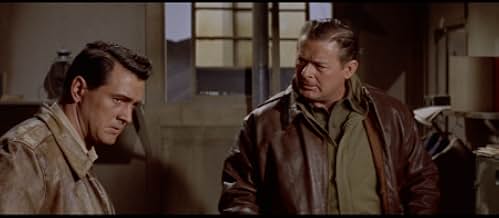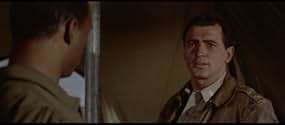अपनी भाषा में प्लॉट जोड़ेंA remorseful bomber pilot-turned-minister rejoins for the Korean War.A remorseful bomber pilot-turned-minister rejoins for the Korean War.A remorseful bomber pilot-turned-minister rejoins for the Korean War.
- पुरस्कार
- कुल 2 जीत
- Mess Sergeant
- (as Alan Hale)
- Gen. Kim
- (काटे गए सीन)
फ़ीचर्ड समीक्षाएं
Rock Hudson is very good as Colonel Dean E. Hess, who in real life was an American minister and United States Air Force colonel who was involved in the so-called "Kiddy Car Airlift," the documented rescue of 950 orphans and 80 orphanage staff from the path of the Chinese advance during the Korean War on December 20, 1950.
As the movie opens we see Hess as a minister but still feels guilt from an accidental bombing of a church and orphanage in Germany during WW2. He isn't sure he is genuine as a minister and goes back into active duty, training Koreans to fly fighter planes. But his soft spot for orphans gets him involved in providing care for them, an activity that he continued in future years. He died, aged 97 in 2015.
Good movie.
It is through his work in Korea that Hudson is able to reaffirm his faith.
Carl Benton Reid plays the town deacon. I remember Reid for playing Hudson's father-in-law in "One Desire" with the mean Julie Adams as his wife and the kindly Anne Baxter, the woman he should have married.
The film does go a little over-the-top with the death scene by Hess's buddy, played to the hilt by Don DeFore. When Hudson tells a dying DeFore that death is where one door opens after another closes is a little too much to take; although, it's effectively done.
Married to Martha Hyer in the film, Hudson soon learns that she is with child when he goes off to Korea. There, he meets Anna Kashfi, a young woman who has fled the ravages of war in her town. Due to his religious upbringing, romance does not evolve around the characters. In fact, she dies tragically near the end of the film.
The remaining part of the film deals with the attempts of Yang (Kashfi) and Hess to get the children out of a warring province to safe haven somewhere else. I thought we were going to see another "Inn of the 6th Happiness" here but we did not.
This is definitely a film of the triumph of the human spirit. It's another solid film for veteran director Douglas Sirk. He made so many of those women's pictures in the 1950 that starred Rock Hudson.
In his book "Sirk on Sirk" Michael Halliday sheds some light on this. Sirk had broken his leg badly and had to direct from a wheelchair which severely limited him. But the main reason for this somewhat heavy handed film was the presence of Dean Hess on the set and his overseeing each scene.
The film is a biography of Dean Hess himself. A man who turns to the church after the trauma of bombing a German orphanage and killing 37 children, Hess leaves his position of preacher in small town Ohio and volunteers for service in Korea. It's an odd choice for a man of his past, but "Killer Hess" as he was known, gets the opportunity to save Korean orphans in the process, putting to sleep his inner demons and putting things right in the world.
Sirk was very put off by Hess' presence on the set and more so by his input. He was clearly a man of much ambiguity, something that fascinated Sirk. Yet Sirk was unable to really express this in meaningful way on the screen. He wanted to give Hess a drinking problem as a way of expressing his pain, but Hess would hear nothing of it. He clearly wanted to be portrayed as a holier than though hero. The result is that the film has an awful self congratulatory feel about it.
Sirk was fascinated by characters who conceal within themselves a deep conflict. To him these were the most interesting of all. In all the movies Sirk made with Rock Hudson, he always cast him as the stabling influence and a foil to those unstable characters around him. Robert Stack in both "Written on the Wind" and "Tarnished Angels" is a perfect example of a split character playing against Hudson as the basically good, well grounded opposite. It's of course extremely ironic since in real life Rock Hudson was surely terribly conflicted by his concealed homosexuality while idolised by the masses as a model of masculine heterosexuality. Perhaps that is part of Sirk's affinity for him. Yet Sirk felt that Hudson's simplicity and basic goodness were suited to playing uncomplicated characters. "Battle Hymn" is the only film in which Sirk cast Hudson as a conflicted character. Had his character been better written there may have been a chance to pull it off. But as it stands, it's a competent and respectable performance, but something of a missed opportunity for Hudson.
The rest of the cast acquit themselves well. Anna Kashfi is particularly effective with her ethereal presence. James Edwards deserves a mention, since his role as a black fighter pilot was certainly ground breaking for its time.
There are however some really cringe inducing moments such as the aforementioned James Edwards breaking into "Swing Low" after an air raid and the final scene of the Korean orphans singing "Battle Hymn of the Republic" for Hess as he returns to Korea with his wife. These moments are meant to be uplifting, but seem now to be in somewhat poor taste.
The Korean children in the film were actually Korean orphans and they are a delight. Sirk had great affinity with young children who in turn gave memorable performances in his movies.
But when all is said and done, "Battle Hymn" is a film best forgotten, unlike his other war film, the remarkable "A Time to Love and a Time to Die" which he would soon make.
क्या आपको पता है
- ट्रिवियाRobert Mitchum lobbied for the lead role. However, the real Col. Dean Hess wouldn't hear of a former jailbird portraying him. He personally approved Rock Hudson instead, not realizing that Hudson was gay.
- गूफ़When Skidmore is wounded and coming back to land, the exterior shots show the canopy open, but in the closeups of Don DeFore (Skidmore) the canopy is closed.
- भाव
Old Man, Lun-Wa: But, Colonel, you seem troubled.
Col. Dean Hess: There's nothing so terrible as war. I killed today.
Old Man, Lun-Wa: Yes, war is evil. I see what is in your heart. Colonel, may a poor, old carver of ivory babble for a moment? Understand that this is no more than babble and may not have more worth than a handful of sand. In times like these can a man of good conscience ask others, 'Protect me, kill for me, but do not ask me to stain my hands?' What must one do when a choice between two evils is all that is offered? To accept the lesser can sometimes be the only choice. In order to save at times we must destroy and in destructiom creates new life.
Col. Dean Hess: Is that the answer?
Old Man, Lun-Wa: The true answer, Colonel, is not in my babble... 'tis in the Book - 'Oh, Lord, though hast seen my wrong. Judge now my cause.'
Col. Dean Hess: Who are you?
Old Man, Lun-Wa: Just a very old man anxious to get back to his stall in Pusan.
- कनेक्शनFeatured in The Twilight Zone: Where Is Everybody? (1959)
- साउंडट्रैकLittle Brown Jug
(uncredited)
American drinking song
Composed by Joseph Winner (1869)
Sung by Jock Mahoney and soldiers during Thanksgiving celebration.
टॉप पसंद
- How long is Battle Hymn?Alexa द्वारा संचालित
विवरण
- चलने की अवधि1 घंटा 48 मिनट
- पक्ष अनुपात
- 2.35 : 1


